The purpose of the Early Career Researcher Committee (ECRC) is to support SCN in the development and implementation of activities that profile and support the growth of early career researchers (ECRs) working in the field of stem cell and regenerative medicine research. SCN seeks to provide ECR community members with the skills and support needed to build world-class research programs and jump-start their careers in academia.
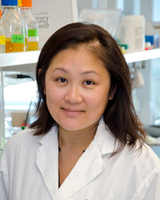
Amy Wong, Chair, Scientist, The Hospital for Sick Children; Assistant Professor, University of Toronto
Dr. Amy Wong is a Scientist in the Program of Developmental & Stem Cell Biology at the Hospital for Sick Children and an Assistant Professor in the Department of Laboratory Medicine and Pathobiology at the University of Toronto. She completed her undergraduate degree in the Life Sciences at the University of Toronto in 2001 and went on to receive graduate degrees at the University of Toronto: a MSc in Cardiovascular sciences in 2003 and a PhD in lung regeneration in 2008. She then joined the SickKids Research Institute in early 2009 as a post-doctoral fellow where she was the first to develop a method to generate airway epithelia that model airway Cystic Fibrosis (CF) lung disease in-vitro. Today she is internationally recognized as a pioneer in using human stem cells to model lung development and disease. Her lab has three main research focus 1) To identify novel genetic and molecular factors regulating lung development and disease; 2) to develop predictive human lung disease models for precision medicine; 3) To generate improved preclinical physiologically relevant lung mimetics for disease modeling using novel bioprinting and microfluidic platforms.
https://lab.research.sickkids.ca/wong/
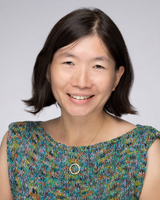
Natasha Chang, Assistant Professor, McGill University
Dr. Natasha Chang received her Ph.D. in Biochemistry from McGill University, and pursued her postdoctoral fellowship at the Ottawa Hospital Research Institute. Dr. Chang joined McGill as an Assistant Professor in the Department of Biochemistry in 2019. Research in the Chang laboratory focuses on understanding the molecular signalling mechanisms that regulate muscle stem cell function and how these pathways are altered in the context of muscle degenerative disease and muscle cancer. The ultimate goal for Dr. Chang’s research team is to identify molecular targets to improve endogenous stem cell regenerative capacity as well as strategies to improve stem cell transplantation therapy.
https://natashachanglab.com/
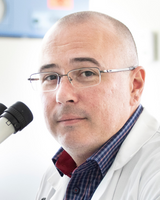
Daniel Coutu, Scientist, Ottawa Hospital Research Institute; Assistant Professor, University of Ottawa
I completed my B.Sc. in Biology at Université de Montréal. I then joined the Division of Experimental Medicine at McGill University for my graduate studies, under the supervision of Dr. Jacques Galipeau (Lady Davis Institute, Jewish General Hospital). My work focused on using bone marrow-derived mesenchymal stem cells for gene and cell therapy, regenerative medicine, and tissue engineering. I then pursued postdoctoral training at the Institute for Stem Cell Research (Helmholtz Center Munich, Germany) under the supervision of Dr. Timm Schroeder. There, I studied skeletal and hematopoietic stem cells using long term, continuous, single cell time-lapse microscopy and quantitative image analysis. The lab relocated to the Department of Biosystems Science & Engineering (ETH Zurich, Switzerland) where I developed highly multiplexed confocal imaging and computational image analysis techniques, specifically designed to study stem cells in whole mouse bones. In 2018, I joined the Regenerative Medicine program at the Ottawa Hospital Research Institute, and the Department of Cellular & Molecular Medicine at University of Ottawa. I am also the inaugural holder of the Research Chair in Regenerative Orthopedic Surgery (The Ottawa Hospital). My lab studies the fundamental biology of skeletal stem cells and their use in regenerative orthopedic surgery.
https://www.ohri.ca/profile/dlcoutu/
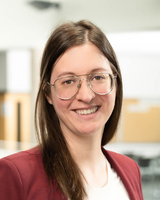
Janelle Drouin-Ouellet, Assistant Professor, University of Montreal
Dr. Drouin-Ouellet has obtained a PhD in Neurobiology at Laval University (Quebec City, Canada) in 2012. She has completed a first postdoctoral training with Professor Roger Barker at the University of Cambridge (Cambridge, UK), where she combined basic and clinical research to study different aspects of Parkinson’s and Huntington’s diseases. She did a second postdoc in Professor Malin Parmar’s group at Lund University (Lund, Sweden) where she has worked on developing simple and efficient methods for direct conversion of induced pluripotent stem cells (iPSCs) and adult human dermal fibroblasts from patients with neurodegenerative diseases. Now an Assistant Professor at the University of Montreal (Montreal, Canada) since August 2018 and a Tier 2 Canada Research Chair in Direct Neural Reprogramming, she is combining direct neural reprogramming and iPSC work to study the pathophysiology of Parkinson’s Disease, as well as working on developing direct glial reprogramming technologies to complexify patient derived cell-based systems with the aim of studying the age-related pathophysiology of neurodegenerative disorders.
https://pharm.umontreal.ca/faculte/lequipe/corps-professoral/fiche/in/in29830/sg/Janelle%20Drouin-Ouellet/
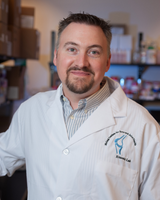
Roman Krawetz, Associate Professor, University of Calgary
I am a member of the McCaig Institute for Bone and Joint Health Research at the University of Calgary. The main pillar of my research program is elucidating the role of tissue resident stem cells within the musculoskeletal tissues and understanding why these stem cells are incapable of contributing injury repair under specific circumstances (e.g. osteoporosis, osteoarthritis, disc degeneration). My lab uses in-depth molecular approaches (in vitro and in vivo) to examine the role of stem cells in pre-clinical transgenic mouse models. My lab has contributed to the understanding of the role of tissue resident stem cells with the normal and arthritic joints and developed novel approaches to induce these cells to contribute to cartilage repair after injury. It is my goal to translate this exciting findings into a novel therapies for difficult to treat chronic injuries in humans.
https://www.romankrawetzlab.com/
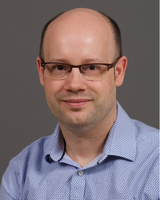
Ben Lindsey, Assistant Professor, University of Manitoba
Dr. Benjamin Lindsey obtained his PhD at the University of Toronto under the supervision of Dr. Vincent Tropepe in the Department of Cell and Systems Biology. Here, he mapped the ultrastructural composition of adult neurogenic niches of the mature zebrafish brain. During his doctoral thesis, Dr. Lindsey further pioneered methods to study adult neural stem cell plasticity to understanding the relationship between adult neurogenesis and the external sensory environment.
In 2014, Dr. Lindsey joined the Australian Regenerative Medicine Institute (ARMI) at Monash University as an NSERC-funded postdoctoral fellow, where he trained with one of the world leaders in zebrafish neural stem cells and regeneration, Dr. Jan Kaslin. During this time, Dr. Lindsey studied the molecular and cellular regulation of active and quiescent neural stem cell populations for brain and spinal cord repair.
In 2017, Dr. Lindsey returned to Canada for his second postdoctoral fellowship with spinal cord and neuroplasticity expert Dr. Tuan Bui, at the University of Ottawa, Brain and Mind Research Institute. During this second, CIHR-funded postdoctoral position, Dr. Lindsey developed larval and adult spinal cord injury models to study the mechanisms regulating spinal cord regeneration.
In February 2019, Dr. Lindsey joined the Department of Human Anatomy and Cell Science at the University of Manitoba as an Assistant Professor, where he has established the first zebrafish facility for neural stem cell research and regenerative medicine. His research program is supported by an NSERC Discovery Grant, NSERC Research Tools and Instruments Grant, Research Manitoba New Investigator Operating Grant, in addition to other institutional funding programs.
http://lindseylab.ca/
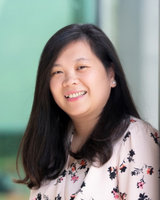
Ly Vu, Scientist, BC Cancer; Assistant Professor, University of British Columbia
Dr. Vu is a Scientist at the Terry Fox Laboratory, British Columbia Cancer Center (BC Cancer) and an Assistant Professor at Faculty of Pharmaceutical Sciences at University of British Columbia (UBC). Dr. Vu is originally from Vietnam with a Bachelor of Science in Biology from Vietnam National University. Dr. Vu completed both her PhD and post-doctoral training at Memorial Sloan Kettering Cancer Center, NYC, US, where she uncovered the critical roles of RNA binding proteins and RNA methylation in pathogenesis of myeloid leukemia. At BC Cancer, Dr. Vu’s laboratory aims to understand molecular mechanisms underlying control of stem cells and pathogenesis of hematological malignancies with a focus on post-transcriptional and translational gene regulation pathways. The ultimate goal is to develop innovative therapeutic approaches for treatment of leukemia and other cancers. Dr. Vu is the recipient of numerous awards including the prestigious Damon Runyon-Sohn Pediatric Postdoctoral Fellowship, the Special Fellow award from the Leukemia and Lymphoma Society, the NIH K99/R00 Pathway to Independence, the American Society of Hematology (ASH) Scholar Award and the Terry Fox New Investigator Award.
https://www.bccrc.ca/dept/tfl/people/ly-vu
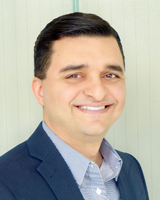
Ma’n Zawati, Assistant Professor, McGill University; Executive Director, Centre of Genomics and Policy
Ma’n H. Zawati (LL.B., LL.M., Ph.D. (DCL)) is an Assistant Professor at McGill University’s Faculty of Medicine and the Executive Director of the Centre of Genomics and Policy in the Department of Human Genetics. He is also an Associate Member of the Department of Equity, Ethics and Policy, the Division of Experimental Medicine and the Faculty of Law at McGill University. His research concentrates on the legal, ethical and policy dimensions of health research and clinical care, with a special focus on biobanking, data sharing, regenerative medicine, professional liability, and the use of novel technologies (e.g. mhealth apps, WGS, WES) in both the clinical and research settings. His work is interdisciplinary, drawing together perspectives from law, ethics, bioinformatics, genomics, and policy. He’s also a frequent presenter on a variety of the most critical and topical issues in healthcare and the biosciences. He has appeared at 150+ international conferences, symposia, meetings, and has shared his expertise with universities, research ethics boards and law firms. Prof. Zawati has published a book (Reciprocity in Population Biobanks – Academic Press 2021), 18 book chapters and over 75+ peer reviewed articles in leading publications such as Nature Reviews Genetics, the Canadian Medical Association Journal, and the Journal of Law and the Biosciences. In 2015, he was awarded the Queen Elizabeth II Diamond Jubilee Scholarship (stay at Oxford University) and was named a Royal Society of Canada Delegate for the IAP Young Scientists of the Year international symposium. In 2021, Prof. Zawati received his J1 FRQS Career Award.
https://www.manhzawati.com/
The purpose of the Training & Education Committee (TEC) is to support SCN in the development and implementation of a regenerative medicine training program that ensures highly qualified personnel (HQP) are well-placed to compete in Canada’s knowledge-based economy and equipped with the skills to work in the regenerative medicine labs and biotech companies of today and tomorrow.
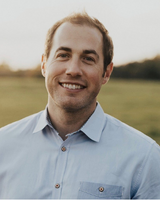
Andrew Pepper, Chair, Assistant Professor, University of Alberta
In 2018, Dr. Pepper was recruited to the Department of Surgery, in the Division of Surgical Research at the University of Alberta as an Assistant Professor. His laboratory in the Alberta Diabetes Institute, examines the underlying mechanisms that govern pancreatic beta cell survival and function, with the ultimate goal of developing and refining cell-based therapies that could become a universal treatment for a broader range of people living with type 1 diabetes. Dr. Pepper has published >40 manuscripts and 4 book chapters related to islet biology, immunology and beta cell transplantation. He is currently a Canadian Research Chair in Cell Therapies for Diabetes and has received funding from the Stem Cell Network, JDRF, MITACS, CIHR, CFI-JELF, Alberta Innovates, New Frontiers in Research Fund, Alberta Diabetes Foundation, University Hospital Foundation and the Canadian National Transplant Research Program.
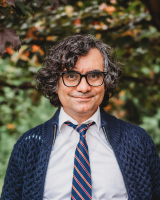
Mohsen Akbari, PhD., P.Eng., FIAAM, MCBS, MCSME, MRSC
Mechanical Engineering, University of Victoria
Dr. Mohsen Akbari is an Associate Professor of Mechanical Engineering, the Director of the Laboratory for Innovations in Microengineering (LiME) at the University of Victoria, an Affiliated Associate Professor at the School of Biomedical Engineering at the University of British Columbia, adjunct professor at Terasaki Institute for Biomedical Innovation and Department of Bioengineering at University of California-Riverside. In addition to his professorship, he is a senior board member at the Canadian Biomaterials Society, board member at the Canadian Society for Mechanical Engineering, member of the Center for Advanced Materials and Related Technologies (CAMTEC), investigator at International Collaboration on Repair Discoveries (ICORD), Associate Member of Djavad Mowafaghian Centre for Brain Health, the co-founder and Chief Scientific Officer at 4M Biotech, and Scientific Advisor at Apricell Biotech. Dr. Akbari obtained his Ph.D. from Simon Fraser University and received postdoctoral training at Harvard Medical School and Brigham and Women’s Hospital. He is the recipient of several awards and recognitions, including the Keston Award, membership of the College of New Scholars at the Royal Society of Canada, Lifetime Fellow of International Association for Advanced Materials (IAAM), Scientist Medal from IAAM, Faculty of Engineering Teaching Excellence Award, Michael Smith Foundation for Health Research Idea to Commercialization Award, NSERC Postdoctoral Fellowship Award, BC Innovation Council Research Award, Kaiser Foundation Award, and recognized as a Canadian Rising Star in Global Health by Grand Challenges Canada. Dr. Akbari is on the editorial board of Biofabrication, International Journal of Bioprinting, Micromachines and Gels. He is also member of the Board of Directors of the Canadian Biomaterials Society. His research findings have been published in 140 peer-reviewed journal papers and book chapters with an h-index of 46 and over 9200 citations. His work has been featured on the cover of 12 Journals and reported in +70 media outlets such as CBC News, Time Colonist, BBC News, Google News, Science Daily, The Telegraph, Fortune, and NSERC website.
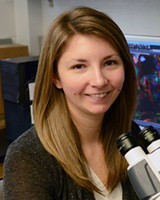
Jessica Esseltine, Assistant Professor, Memorial University of Newfoundland
I grew up in a small town in southwestern Ontario made famous for killing Jumbo the Elephant. I completed most of my training at Western University. I discovered pluripotent stem cells quite late in my training and I am so grateful that I found my scientific passion. Since moving to beautiful Newfoundland I am tackling how cells communicate with each other during cell fate specification. With the support of the Stem Cell Network, I am using patient-derived iPSCs to understand hereditary heart disease in Newfoundland. My team uses cutting-edge techniques in cell and molecular biology including CRISPR-Cas9 genetic engineering of pluripotent and multipotent stem cells, high-resolution imaging, stem cell and 3D organoid culture.
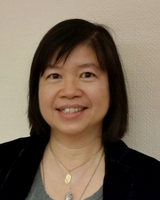
May Griffith, Professor, Department of Ophthalmology, University of Montreal, Maisonneuve-Rosemont Hospital Research Centre
May holds the Canada Research Chair in Biomaterials and Stem Cells in Ophthalmology and Caroline Durand Foundation Research Chair in Cellular Therapy of the Eye. She is currently Director of the Cornea and Anterior Segment Axis of the Quebec Vision Health Research Network. MG is known for her bench-to-bedside pioneering work in translational regenerative medicine and in situ tissue regeneration. She led a multi-national, interdisciplinary team through the development and successful clinical testing of the world’s first biosynthetic corneal implants that promoted human corneal tissue and nerve regeneration in a clinical trial in Sweden. The cell-free implants stimulated the patients’ own cells to migrate into the matrix, proliferate and differentiate into neo-corneas. The team subsequently completed a second clinical trial with biosynthetic corneal implants containing an inflammation-suppressing polymer network on high-risk patients. Most recently, MG and her team developed a synthetic, biocompatible and adhesive liquid hydrogel (LiQD Cornea) for repairing corneal perforations in place of toxic cyanoacrylate glue. LiQD Cornea is applied as a liquid, but quickly adheres and gels within corneal tissue defects. Then its similarity at a molecular level to a natural tissue framework promotes tissue regeneration, treating corneal perforations effectively without the need for transplantation. MG continues her biomaterials-based research for cornea and retina regeneration, and angiogenesis in collaboration with other researchers.
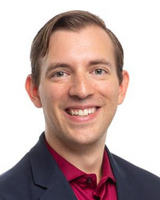
Matthew Hildebrandt, Product Manager, STEMCELL Technologies
Matthew Hildebrandt is a Product Manager at STEMCELL Technologies in Vancouver for products that support human pluripotent stem cell research. Following his PhD in Experimental Oncology from the University of Alberta in 2014 he joined the lab of Dr. James Ellis at SickKids in Toronto as a Postdoctoral Research Fellow where he started working with pluripotent stem cells. During his time in Toronto he participated in several SCN workshops held during the Till & McCulloch meetings that helped support his transition to an industry position. He now volunteers time back to SCN to support the next generation of trainees.
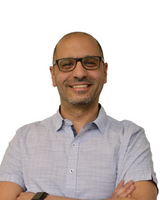
Samer Hussein, Associate Professor, Université Laval; Researcher, Oncology Division, Centre Hospitalier Universitaire (CHU) de Québec-Université Laval Research Center
Dr. Samer Hussein is an associate professor and researcher at Université Laval and its affiliated Cancer Research Center. Dr. Hussein completed his Ph.D. in Neurological Sciences at McGill University, Montréal, Canada, and his post-doctoral training at the University of Helsinki, Finland, and later at the Lunenfeld-Tanenbaum Research Institute in Toronto, Canada. He has published seminal work in the field of reprogramming demonstrating several key findings on how reprogramming to induced pluripotent stem cells affects the chromatin state, genetic stability, and gene expression of cells undergoing this process of induced cell fate change. His team now focuses on understanding the molecular underpinnings governing stem cell fate decision during development and in cancer. They use several bioinformatics and sequencing approaches, such as long read RNA sequencing, and stem cell differentiation models, such as human cerebral organoids and glioma stem cell invasion models, to understand the molecular mechanisms and functional interactions of long non-coding RNAs during development and cancer.
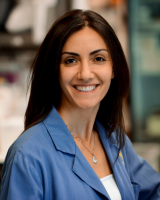
Golnaz Karoubi, Scientist and Principal Investigator, Toronto General Hospital Research Institute; Assistant Professor, University of Toronto
Dr. Golnaz Karoubi is a Scientist and Principal Investigator at the Toronto General Hospital Research Institute (TGHRI, University Health Network). She is an Assistant Professor in the department of Laboratory Medicine and Pathobiology and is cross appointed in the department of Mechanical Engineering at the University of Toronto. Dr. Karoubi received her PhD in Applied Science and Engineering at the University of Toronto in 2006 and joined the Lung Regenerative Medicine Program in the Department of Clinical Research in Berne University, Switzerland for a post-doctoral research fellowship. She stayed on as a Group Leader in 2008 to direct the basic and transitional science as related to Lung Regenerative Medicine until 2012. In late 2012, she joined the team of Dr. Tom Waddell at the TGHRI as a Senior Scientific Associate, was appointed to Assistant Scientist at the TGHRI in November 2019 and to Assistant Professor in the Department of Laboratory Medicine and Pathobiology in July 2020. She received her Scientist appointment TGHRI in April 2023. Her research interests include development of practical approaches for treatment of lung and airway disease. Studies focus on: (1) Airway regeneration; (2) Use of stem cell-derived airway cells for tissue engineering applications; and (3) Cell-based therapy for end-stage lung disease.
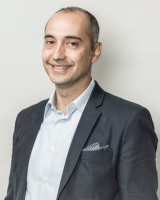
Terry Sachlos, Director, Stem Cell Engineering Lab, York University; Assistant Professor, York University
Dr. Terry Sachlos is Director of the Stem Cell Engineering Lab at York University and an Assistant Professor in the Department of Mechanical Engineering, Lassonde School of Engineering at York University in Toronto. He is also the Associate Director of the Bergeron Entrepreneurs in Science & Technology program and a member of the Department of Biology Graduate Program at YorkU. His research interests lie in regenerative medicine with a specific focus on elucidating stem cell-extracellular matrix interactions of the hematopoietic & leukemic stem cell niche to regulate stem cell fate decisions and 3D printing of vascularized bone marrow for cell therapy and drug screening applications. Prior to joining YorkU, he received his doctorate from the University of Oxford and conducted postdoctoral research at Harvard, MIT and McMaster. He has authored multiple peer-reviewed articles, including a publication in the top-tier journal Cell, which have collectively garnered over 3,000 citations. Terry is a serial entrepreneur, having filed 8 patent applications, and co-founded several start-up companies to commercialize his research. His research findings have also been translated into a clinical trial to repurpose thioridazine, an established anti-psychotic drug, as a novel anti-leukemia drug. His research is currently supported by NSERC and CIHR.
The purpose of SCN’s Trainee Communications Committee (TCC) is to contribute to the development and delivery of SCN’s training program for trainees in the stem cell and regenerative medicine community.
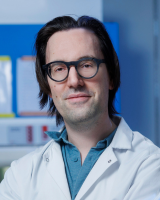
Tyler Wenzel, Chair, Post-Doctoral Fellow, University of Saskatchewan
Tyler is a postdoctoral fellow setting up a stem cell and regenerative medicine facility for the University of Saskatchewan. Their research, which is overseen by Drs. Darrell Mousseau and Jane Alcorn, is very multidisciplinary, covering topics such as brain homeostasis, central nervous system tissue regeneration, brain and intestinal disease etiology, pharmacokinetics and the gut-brain axis. The ultimate goal of their research is to create better treatments for neurodegenerative and inflammatory bowel diseases. Tyler is particularly passionate about developing better models of these human diseases and unlocking the therapeutic and pharmacological potential of organoids as well as the stem cells they are derived from. Prior to their career as a scientist, Tyler was a high school science and mathematics teacher, and they are excited to bring their experience and passion for teaching to the Trainee Communications Committee. I strongly believe stem cells are key to improving the quality of life for many people around the world, and they are thrilled to be part of developing this technology. In their spare time, you can find Tyler hiking, downhill skiing, going to concerts, taking photographs, podcasting, or making sci-comm videos.
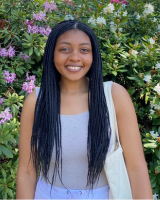
Holly Jiogo, Vice-Chair, MSc Student, McGill University
Holly is a MSc student in human genetics, studying under the supervision of Dr. Colin Crist at McGill University. In her research, she aims to discover how RNA granule dynamics can contribute to the regenerative potential of muscle stem cells. Holly is also a huge advocate for equity, diversity and inclusion in STEM, and believes that a focus on inclusive science communication and outreach can help bridge the gap between traditionally scientific and non-scientific communities (for the benefit of everyone!). When she’s not analyzing samples under the microscope, you can find her reading, listening to podcasts or eating delicious food!
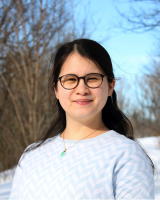
Fanny-Meï Cloarec-Ung, PhD Student, Université de Montréal
Fanny-Meï is a PhD student in molecular biology at the Institute for Research in Immunology and Cancer at the Université de Montréal. Her research focuses on age-associated mutations in clonal hematopoiesis to understand the molecular and cellular trajectories potentially leading to myelodysplastic and leukemic syndromes. Outside of the lab, she enjoys travelling, hiking, photography and discovering new foods.

Nerea Cuesta-Gomez, Postdoctoral Research Fellow, University of Alberta
Nerea is a Postdoctoral Research Fellow in Andrew Pepper and Greg Korbutt’s lab at the University of Alberta. Her research focuses on the use of mesenchymal stromal cells for tissue vascularization and islet transplantation for the treatment of Type 1 Diabetes. Nerea is deeply committed to promoting equity and diversity within the stem cell research community. Recognizing the importance of diverse perspectives and experiences in driving innovation, she is dedicated to advocating for inclusive practices that empower individuals from underrepresented backgrounds to thrive in STEM fields. Nerea believes that fostering a diverse and inclusive environment not only enriches scientific discourse but also strengthens the ethical foundations of our research endeavors. Outside of the lab, she loves travelling around the world, skiing and spending time with her dog, family, and friends.
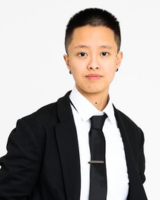
Amelinda Firdauzy, MSc Student, Simon Fraser University
Amelinda is a second year MSc student in biological sciences at Simon Fraser University. In the lab, they are currently studying a rare genetic disease named Tuberous Sclerosis Complex (TSC), specifically caused by the mutation of the tuberin (TSC2) protein gene, under the supervision of Dr. Lisa Julian. Amelinda’s research goal is to establish the first human cell model of cortical tubers, which is an example of TSC manifestation in the brain and the underlying cause of epilepsy in TSC. This model will help further understand the development and mechanisms of the aberrant stem-like giant cells population observed in epileptic brain lesions of TSC patients. Outside of research, you may find them wrestling plastic rocks at various bouldering gyms.
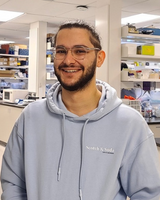
Jules Granet, PhD Student, McGill University
Jules is a PhD student in Natasha Chang’s Lab at McGill University. His project aims to understand how autophagy contributes to muscle stem cell fate determination regenerative functions in healthy conditions and in the context of Duchenne muscular dystrophy. Outside the lab, he loves travelling to discover new places, eating, watch movies and spending time with friends.

Courtney Irwin, MSc Student, University of Toronto
Courtney is a MSc student at the University of Toronto’s Laboratory Medicine & Pathobiology program working under the supervision of Dr. Karun Singh at the University Health Network. Courtney’s work aims to better understand the effect of Autism spectrum disorder risk genes on sensory nervous system development using 3D stem cell models. When she is not in the lab, you can usually find her thinking about the lab, attending a concert, attempting to bake, or hanging out with her cat, Wren.
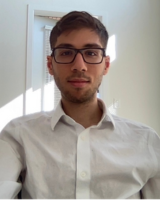
Ahmed Kabil, PhD Candidate, University of British Columbia
Ahmed Kabil is a PhD candidate working in the biomedical research centre at the University of British Columbia. He obtained a high honours BASc in applied science from the University of Toronto. Ahmed’s research focuses on understanding how the immune system is sculpted during development (particularly type 2 innate lymphoid cells (ILC2)) and how perinatal microbial exposures result in lifelong alterations in immune response to disease. He is developing several elegant genetic tools that will allow us for the first time to monitor the emergence, development and history of ILCs throughout life and evaluate how they are involved in a variety of animal model diseases. Ahmed is a big believer in mentorship, outreach, and science communication. Beyond his research, he enjoys teaching and is passionate about providing mentorship. In his free time, Ahmed loves playing football.
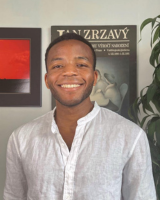
Oreoluwa Kolade, PhD Student, University of Toronto
Oreoluwa is a PhD student with a passion for regenerative medicine, tissue engineering, and machine learning. His current research focuses on the use of mesenchymal stromal cells for therapeutic purposes, with a particular interest in the challenges related to cell manufacturing. In addition to his research, Oreoluwa is dedicated to fostering connections between academia and industry and is interested in developing workshops for graduate students to help bridge the gap between the two worlds. Beyond academia, Oreoluwa is an avid sports enthusiast with interests in boxing, MMA, and Formula One. His dedication to both academic pursuits and personal interests has helped him develop a well-rounded perspective and a drive for success.
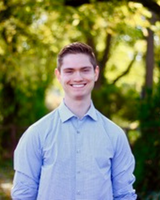
Coulter Montague Szakaly, MSc Student, University Health Network
Coulter is a second year MSc student in Laboratory Medicine and Pathobiology at the University of Toronto, studying under the supervision of Dr. Michael Laflamme at the University Health Network. In his research, Coulter aims to establish a novel bioreactor architecture for the large-scale production and maturation of human pluripotent stem cell-derived cardiomyocytes. Outside of the lab, he loves reading, scuba diving, snowboarding, playing hockey, and he’s always looking for new ways to promote scientific communication to researchers at every level.
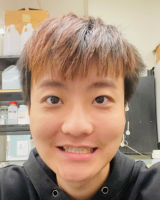
Haochen Sun, MSc Student, University of Calgary
Haochen completed his Bachelor of Science in human biology and immunology at the University of Toronto. He decided to continue his master’s degree by studying biomedical engineering in the Krawetz lab at the University of Calgary. His project aims to use human dermal mesenchymal stem cells to treat cartilage damage in mice. Haochen’s goal is to determine whether stem cells generated from bioreactors versus static tissue culture flasks can both aid in cartilage repair. Outside of his work in the lab, he enjoys playing sports, listening to music and learning new languages.
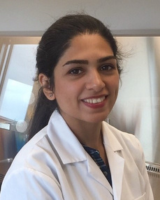
Parisa Varshosaz, PhD Candidate, Laurentian University
Parisa is a PhD candidate in the biomolecular sciences program working under the supervision of Dr. Alexander Moise in the Medical Sciences Division at Northern Ontario School of Medicine University and Laurentian University. Her research focuses on exploring the role and regulation of retinoic acid (RA)-signaling during cranial development. Parisa’s work, in collaboration with Dr. Maureen Kane (U. Maryland), Paul Trainor (Stowers Institute), and Andrew Wilkie (Oxford University), has revealed that retinoic acid is required for the differentiation of cranial mesenchymal cells towards a calvarial osteoblast fate. Moreover, mutations that affect retinoic acid levels, contribute to the pathogenesis of a group of congenital disorders known as craniosynostosis. Her thesis work is currently focused on the self-regulatory pathways that shape retinoic acid signaling via feedback regulation and in response to Yes-associated Protein (YAP) signaling. Parisa’s studies employ a wide range of molecular biology and gene-editing techniques to uncover the critical role of RA-signaling in the differentiation of progenitor cells towards osteoblasts and osteocytes. She is excited to be a member of SCN’s Trainee Communications Committee, not only to learn from leaders in the stem cell field, but also to help young scientists effectively improve their skills and pursue rewarding scientific careers.
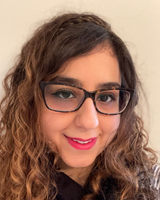
Fereshteh Sadat Younesi, PhD Student, University of Toronto
Fereshteh is a PhD student in biomedical sciences at faculty of dentistry at University of Toronto. She is working under the supervision of an amazing scientific leader, Dr. Boris Hinz at St. Michael hospital. Her research focuses on developing the strategies to boost (maintain) the regenerative potential of Mesenchymal stromal cells (MSCs) through manipulation of MSc mechanical response and memory. Particularly, she is studying how epigenetic patterns change the behaviour of MSCs in response to plastic-stiff environment, which is widely used for pivotal expansion of MSCs after isolation from donors. Outside the lab, she enjoys thinking about scientific challenges, exploring new places, hiking, listening to Persian music and reading Persian poetry. Recently, she has challenged herself to learn musical instruments, called Setar.
She is excited to be part of the TCC and to help graduate students to improve their skills for their career goals while she is learning new skills.
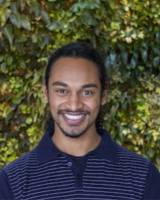
Dylan Siriwardena, Postdoctoral Fellow, University of Toronto
Dylan is a postdoctoral fellow in Dr. Aaron Wheeler’s lab at the University of Toronto. His research focuses on understanding early placenta formation and developing prenatal diagnostics for congenital and placental disorders. Dylan is passionate about scientific communications, having participated in numerous outreach events including Stem Cell Talks and Science Rendezvous. When not in the lab, Dylan enjoys rollerblading, running, and playing dungeons and dragons.
The purpose of the Patient Committee is to support SCN in patient engagement initiatives and inform the direction of the Network’s public facing materials.
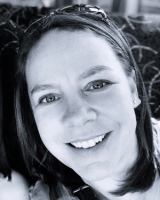
Sarah Benedict is a lifelong resident of Ottawa, where she lives with her husband and two children. She is a former Dental Hygienist who is now an active member of her community, managing many of her kids sports teams, and is involved with several committees at the kids schools. When not at the soccer field or hockey rink, Sarah also enjoys travelling.
In Early 2015 Sarah was diagnosed with Neuromyelitis Optica Spectrum Disorder, and underwent an Autologous Stem Cell Transplant later that year under the care of Dr. Harold Atkins at the Ottawa Hospital.
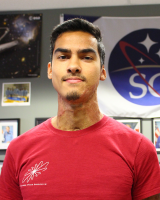
Hello I’m Kevin Bolusi, I was electrocuted in 2015 resulting in third degree burns over 75% of my body and an above knee amputation of my left leg. I was placed into a coma and my parents consented to my participation in an SCN- funded clinical trial led by Dr. Véronique Moulin. The research was testing an autologous tissue-engineered skin substitute. The treatment is faster than skin grafting, and the risk of rejection is much lower due to the use of personalized skin cells. My recovery has been remarkable. I graduated from Concordia in aerospace engineering and now work as a mechanical designer. In my free time, I’m a paraclimber and paraskier.
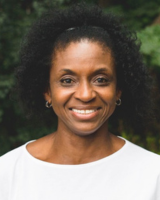
Charmain Brown is a dedicated educator with the York Region District School Board with extensive leadership in curriculum, instruction, equity and inclusion. She is also an Adjunct Professor in the Faculty of Education at Tyndale University. Her two young adult children underwent successful gene therapy for Retinitis Pigmentosa after several years of community and political advocacy for the vision community. Charmain resides in Pickering, Ontario with her partner and two children.
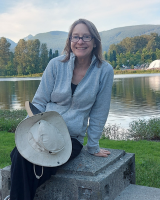
Karen Peat is a devoted mother, wife, community member and type 1 diabetic. Karen was diagnosed with diabetes at age 11 and was faced with the lifelong challenges of managing the disease. During her third pregnancy, Karen fell into a coma while napping. Although both her and her baby survived the episode, Karen’s healing took years. In 2004, Karen successfully underwent a groundbreaking stem cell transplant, coined the Edmonton Protocol, developed by Dr. James Shapiro and colleagues at the University of Alberta. Today, Karen resides in the breathtaking landscapes of Vancouver, British Columbia, cherishing each moment and embracing all that life has to offer.
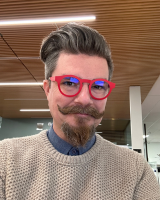
Joshua Robertson is a university student advisor, trivia aficionado, father of two and a Type 1 Diabetic. He brings lived experience to the committee as a participant in a multi-year, first-in-human, Type 1 Diabetes stem cell trial (see the documentary “The Human Trial“). Given his first-hand experience with the incredible potential of stem cell-based therapeutics, he hopes to lend his voice and perspective to promote their further exploration.